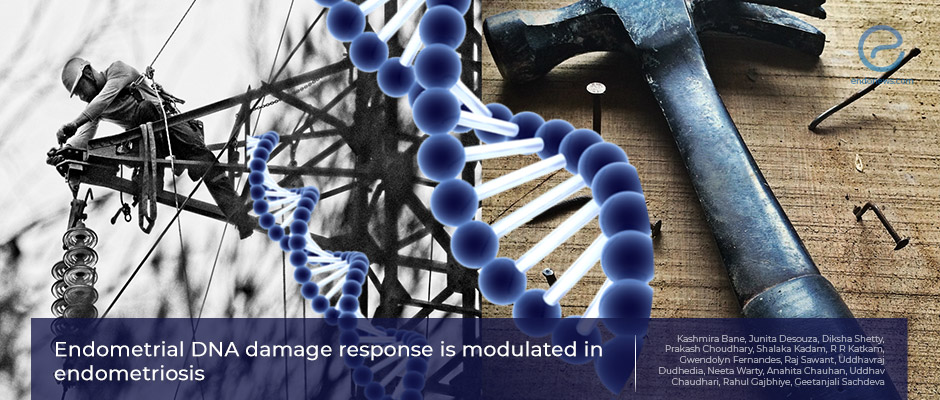DNA damage response in eutopic endometria of endometriosis patients
Mar 22, 2021
DNA damage response dysregulation in eutopic endometria of women with endometriosis
Key Points
Highlight:
- Dr. Sachdeva group from India suggests that the expression of DNA damage response (DDR) genes in endometria of women are altered in endometriosis, compared to control.
Background:
- Molecular mechanisms that enable endometriosis tissues to grow at extra-uterine sites have been investigated extensively.
- Endometriotic lesions show higher susceptibility to DNA damage due to high oxidative stress.
- Consequently, somatic mutations accumulate in various genes (ARID1A, PTEN, TP53, PIK3CA, KRAS,...)
- Ectopic endometriotic lesions harbor somatic mutations.
- However, it remains still unknown whether the eutopic endometrium also manifests dysregulated DDR genes in endometriosis.
Key points:
- This case–control study includes 40 women with endometriosis and 26 controls.
- For DNA damage genes analysis , 84 genes of relevance in the DNA damage signaling pathway were evaluated.
- Endometrial expression of DDR genes was significantly higher in women with endometriosis, compared to the control group.
- DDR proteins, especially those belonging to the GADD (Growth Arrest DNA Damage Inducible) family, were found to be specifically increased in endometriosis.
Conclusions and Limitations:
- Eutopic endometrium in endometriosis encounters DNA damage-inducing stimuli, either of higher strength or for a longer duration than in control.
- The research was conducted on a limited number of endometrial samples.
- Further molecular mechanism studies are required to reveal the cause of DDR dysregulation.
Lay Summary
The DNA damage response (DDR) is a network of cellular pathways that sense, signal, and repair the lesions occurring in DNA. Surveillance proteins that monitor DNA integrity activate the DNA repair pathways in response to DNA damage and try to prevent the generation of potentially deleterious mutations.
Endometriosis is an estrogen-dependent disorder. Molecular mechanisms for the development of endometriotic lesions in a variety of extra-uterine sites have been widely examined. Similar to those of cancer cells, endometriosis tissues show higher susceptibility to DNA damage due to high oxidative stress and accumulate somatic mutations in various genes such as ARID1A, PTEN, TP53, PIK3CA, KRAS, or PPP2R1A.
Somatic mutations reported in endometriosis, suggest the presence of dysregulation of DNA damage and the repair pathways. Additionally, the eutopic endometrium of endometriosis patients also manifests dysregulation of similar genes. Such studies are relevant, considering that the eutopic endometrium is the most likely source of cells that form endometriotic lesions at ectopic sites.
Dr. Sachdeva group from India performed a case–control study for investigating whether the eutopic endometria of endometriosis patients show signs of DNA damage, whether these cells have the competence to respond to DNA damage, and to see whether these cells show any alteration in the expression of DNA repair genes. This paper was recently published in the journal “Human Reproduction”. This study included 40 women with endometriosis, and 26 control women without endometriosis. For the analysis of DNA damage genes, 84 genes of relevance in the DNA damage signaling pathway were evaluated for their expression in eutopic endometrial samples.
Endometrial expression of DDR genes and intensity of immunolocalized r-H2AFX were significantly higher in women with endometriosis, compared to the control group. DDR proteins, especially those belonging to the Growth Arrest DNA Damage Inducible family, were specifically increased in women with endometriosis. This was confirmed by the analysis of the phase-matched control samples.
From this data, Dr. Sachdeva group suggests that eutopic endometrium encounters DNA damage-inducing stimuli, either of higher strength or for longer duration in endometriosis than normal conditions. It would be interesting to understand the role of higher genomic insults in the origin and/or progression of endometriosis.
Research Source: https://pubmed.ncbi.nlm.nih.gov/33246341/
Endometriosis Eutopic endometrium Ectopic endometrium DNA damage DNA damage response DNA repair H2AFX

